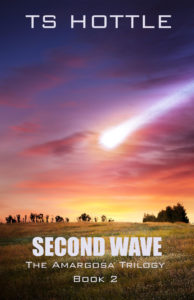This week we are talking with Sci-fi author TS Hottle. You can find him on his website: http://tshottle.com, on Twitter: @tshottle, or on his Facebook under TS Hottle Science Fiction
1. How long have you been writing and what is your proudest accomplishment so far?
I’ve written for myself since I was in high school, flipping back and forth between crime and science fiction. But around 2000, I decided to make a go at it professionally. Timing was the biggest challenge. Had I waited two weeks, my first novel might have found a home in New York instead of a small press in West Virginia that was already struggling.
2. What advice would you offer new writers?
Write. And write some more. And then write again. It’s something you have to do constantly to get better.
3. What is something that you struggle with the most when you are writing?
In terms of narrative, wandering off the subject, especially with scifi, because some aspect of the universe is so interesting to me that I forget the reader will be left wondering when Johnny’s going to actually jump off the cliff.
4. As a writer, do you have any literary pet peeves when reading books?
Mine usually revolve around POV issues that should be fixed during editing or done because it’s cool. I never cottoned to switching from first to third, especially when there are techniques in close third that do the same thing seamlessly. And head-hopping, which only Stephen King and George Pelecanos seem to pull off successfully, drives me to distraction.
5. When you decided to put your books out for sale, did you go Indie, small press, or with an agent? And what factors contributed to that decision?
I started out traditional and sold my first novel to a small press. I went indie to burn off that series while I worked on a more ambitious crime novel. When that failed, I went indie originally because I thought, “Hell, just throw it out there and forget about it.” But as time went on, I thought no, I really want people to read this. So I’ve revamped all my covers and started working on marketing.
Now, I do my science fiction indie because I’m a bit of a control freak, but I have that crime novel that’s been rewritten over and over that will be headed to New York later this year. Haven’t decided its fate if that doesn’t land.
6. Are you working on anything new?
The final installment of the Amargosa Trilogy. I’m doing the first draft as a screenplay to force myself to focus on the story. It’s been fun so far, but definitely a radical change to writing straight prose.
7. Would you describe yourself more as a “pantser” or an “architect” type of writer? (someone who makes it up as they go along – writing by the seat of their pants, or someone who plans meticulously)
I tend to be an architect. Except when I’m not. I’m not sure any two of my stories have been written exactly the same way. The first Amargosa novel, Broken Skies, and Tishla were all outlined. Second Wave was not.
8. What is your writing process like?
I took to King’s admonition to write with the door closed. I might bounce a piece of a first draft off someone to see if it’s working, but otherwise no one sees that completed draft. I’ll do a second pass to clean up before releasing it to the betas or hiring an editor. They’re responsible for how I do the third draft. I’ll do a quick search-and-replace to weed out certain words or phrases and a final Grammarly pass before a story goes off to wherever it’s headed.
9. Do you use any special tools or programs to help you write?
I tried using Scrivener. I really wanted to like it. Honestly. But I need to just sit down and write, so I’m back to just banging out in Word.
Get off my lawn!
10. Is there anything else that you’d like to share with readers or aspiring writers?
Persistence is your friend. It’s how you get better. It’s how you get noticed. It’s how you keep producing even when it seems like a fool’s errand.

